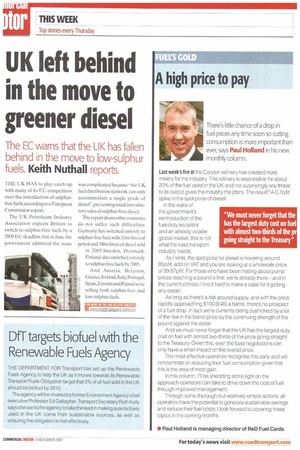A high price to pay
Page 14

If you've noticed an error in this article please click here to report it so we can fix it.
There's little chance of a drop in fuel prices any time soon so cutting consumption is more important than ever, says Paul Holland in his new monthly column.
Last week's fire at the Coryton refinery has created more misery for the industry. This refinery is responsible for about 20% of the fuel used in the UK and not surprisingly any threat to its output gives the industry the jitters. The result? A 0.7p/lit spike in the spot price of diesel.
In the wake of the government's reintroduction of the fuel-duty escalator and an already volatile global market, this is not what the road transport industry needs.
As I write, the spot price for diesel is hovering around 85p/lit; add on VAT and you are looking at a wholesale price of 99.87p/lit. For those who have been fretting about pump prices reaching a pound a litre, we're already there — and in the current climate I find it hard to make a case for it getting any easier.
As long as there's a risk around supply, and with the price rapidly approaching $100 (£48) a barrel, there's no prospect of a fuel drop. In fact we're currently being cushioned by a lot of the rise in the barrel price by the continuing strength of the pound against the dollar.
And we must never forget that the UK has the largest duty cost on fuel with almost two-thirds of the price going straight to the Treasury. Given this, even the best negotiations can only have a small impact on the overall price.
The most effective operators recognise this early and will concentrate on reducing their fuel consumption given that this is the area of most gain.
In this column, I'll be shedding some light on the approach operators can take to drive down the cost of fuel through improved management.
Through some thorough but relatively simple actions, all operators have the potential to generate sustainable savings and reduce their fuel costs; I look forward to covering these topics in the coming months.
"We must never forget that the has the largest duty cost on fuel with almost two-thirds of the pr going straight to the Treasury"






















































































































































































